#Gorbeau Raid
Explore tagged Tumblr posts
Text










Cosette bonding with her father after the wound. Volume 4, Book 4, Chapter 1.
Clips from <Il cuore di Cosette>.
#Les miserables#les mis#My Post#Cosette#The Lark#Mlle. Ursule#Jean Valjean#Father and daughter#Owl and Wren#Rue Plumet#Gorbeau Raid#The Brick#Il cuore di Cosette#Les Mis Letters
18 notes
·
View notes
Text
What sane person would send Javert as a spy? A man who is pathologically unable to lie and who carries all his papers on himself! (I am looking at you, the Prefect of Police, M. Gisquet – you are good for nothing!) This is an amazing contrast with Jean Valjean, who is so skilled at disguising himself and lying with a poker face. Javert did not even make an effort to pretend! And then he “smiled with a smile than which nothing more disdainful, more energetic, and more resolute could be seen in the world.” He was obviously prepared for such a turn of events and was willing to die immediately: “then finish the business with a blow from a knife.” Those who claim that Javert never had suicidal tendencies before derailing are definitely missing something. This episode and the one during the Gorbeau house raid, when he recklessly risked his life, tell us a different story. (To me, he is still endlessly mesmerising. I just can’t take my eyes off him.)
And this: “Spy,” said the handsome Enjolras, “we are judges and not assassins.” Just in case anyone forgot! But jokes aside, he is thinking strategically, anticipating a lack of cartridges and powder. 50 men against 60,000 — that’s really scary. And since there is nothing worse than waiting, Enjolras decides to send his own spy, Gavroche.
Once again, it’s a golden hour for Gavroche as he recognized Javert. And it was also quite amusing because he talks like an old man: “Ah bah! impossible! My sight is bad! I am dreaming! can this be? no, it is not! but yes! why, no!” And then, before leaving the barricade, Gavroche claims Javert’s gun in the most hilarious way possible: “I leave you the musician, but I want the clarinet.”
In Hapgood’s translation, 2 minutes (before the fall of the barricade) turned into 10 minutes. She is more generous than Hugo.
63 notes
·
View notes
Text
How successful would Inspector Javert…
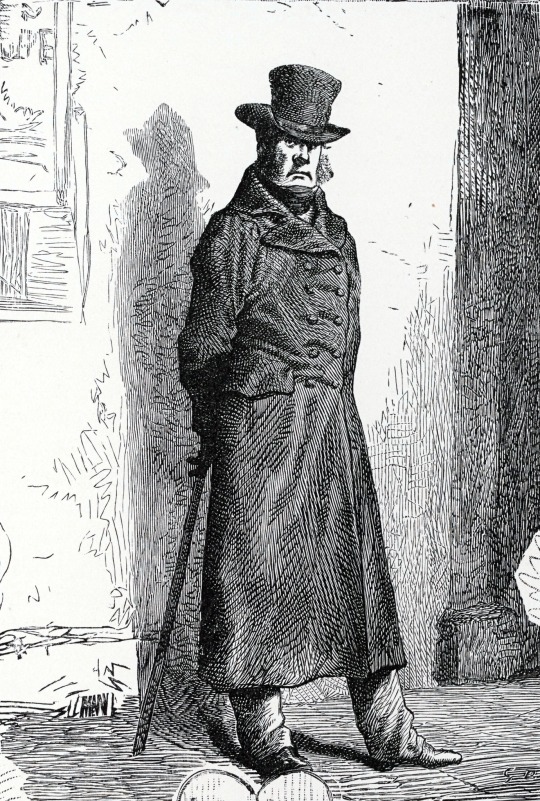
Propaganda for the mic skills:
Generally has zero charisma, but occasionally has the best one liners. Example from the book: the Gorbeau House raid scene. Example from the musical: Javert’s Intervention.
/
/
/
Propaganda for the wrestling skills:
I mean, I don’t know if he could actually win a match, but that would definitely be part of the fun. To understand this, just watch any performance of The Confrontation after 2015.
/
/
/
Would you like to submit a character? Click this link if you do!
#could they be a pro wrestler#javert#inspector javert#javert les mis#les mis#les mierables#les miz#les miserables#les misérables#les mis au#les mis adaptations#broadway#broadway musicals#les mis book#the confrontation#les miserables 2012#les miserables book#les miserables broadway#tumblr polls#polls#character polls#fandom polls#wrestling#wrestling polls#poll time#hyper specific poll#poll game#wwe#professional wrestling#pro wrestling
86 notes
·
View notes
Text
I like mentioning things from the gorbeau house raid to my friends and family because they know nothing about it and they love jumping to conclusions. They just say things and it’s spectacular. Like maybe that’s the Les Mis that I wanna be reading right now.
#it’s always that scene somehow#they just love making shit up about that scene#les mis#les miserables#the brick
11 notes
·
View notes
Text

They made this in an almost same way in <Il cuore di Cosette>!
This bit of Les mis is very funny:
Marius heard Mother Jondrette’s heavy hand fumbling at his lock in the dark. The door opened. He remained nailed to the spot with the shock and with horror.
(…)
Mother Jondrette raised her eyes, did not see Marius, took the two chairs, the only ones which Marius possessed, and went away, letting the door fall heavily to behind her.
Marius when Madame Thenardier enters his room:

#Les miserables#les mis#Marius#Mme. Thenardier#Gorbeau Raid#They made this into that cartoon show!#The Brick#Il cuore di Cosette#Spongebob#Meme#Les Mis Letters
105 notes
·
View notes
Text
The Thénardiers are awful and it’s horrible that they cared so little about their sons, but M Thénardier using Rousseau’s treatment of his children as a justification may be the most darkly funny thing he’s said.
The entire situation does have a dark comedic element, probably because the one being lied to is Gillenormand and because the youngest sons are treated well. Aside from the heartbreaking fact that the Thénardier children were too consumed by poverty to notice their siblings, the arrangement isn’t as bad as it could be?
It’s tragic in that they mean more as a basis of material earnings than as people, though, even to the kinder Magnon. Their parents are the first to not care, but institutions are equally cold. Thénardier is, unfortunately, right that no one’s going to look into the situation when the children are poor. That the deaths of Magnon’s actual children were only noted by her (and indirectly by her associates) is a terrible sign of how little society valued the children of the poor and of how dangerous early childhood was (an epidemic taking both of them in a day).
Worse still, they have become more of Javert’s victims, the arrests following the Gorbeau raid taking away their mother figure. It’s so sad to watch the eldest lose the note because his fingers are too cold to hold it.
25 notes
·
View notes
Text







Marius trying to find one of the man looking for, who 'saved' his father. Volume 5, Book 5, Chapter 8.
Clips from <Il cuore di Cosette>.
#Les miserables#les mis#My Post#Marius#Cosette#Lark and Booby#Cosette's Wedding#Thenardier#Jean Valjean#Parisian Sewer#Col. Pontmercy#Mme. Thenardier#Patron-Minette#Gorbeau Raid#The Two Who Marius Owed#And this time for his father.#(Which is actually NOT.)#The Brick#Il cuore di Cosette#Les Mis Letters
10 notes
·
View notes
Text
One more mention of cholera! I really miss the cholera digression in the Brick. Was it so hard to write one more digression? Marius and Cosette did not notice it, so we also should not notice it. Though it was such a big thing and claimed around 19,000 lives in six months. How preoccupied one should be not to notice it! And Hugo was obviously not interested. None of those several dozen inhabitants of Paris who operate in Les Mis died of it (Lamarque doesn’t count, he is not a character here) – it’s a miracle! I really want to know how Jean Valjean reacted to the news about the cholera epidemic. Did he stay home more than usually? Did he not worry about it at all? (In the next chapter, we'll find out that it did not affect his habit of going out to walk in the evening.)
Cosette and Marius continue learning new things about each other, and they find further similarities and differences in their life stories. Marius is trying to brag about his baron title, and Cosette reaction is just adorable: “this had produced no effect on Cosette. She did not know the meaning of the word. Marius was Marius.”
This chapter is not as easy-going as the previous one. “Loving almost takes the place of thinking,” alerts Hugo. It’s about Marius, who tries to brush aside memories about the Gorbeau house adventure, though he subconsciously understands that this is important, and they should have discussed it with Cosette. Instead, he suppresses this memory, preferring to remain in “a rosy cloud.” This will hit them quite painfully.
Cholera-related cartoon from 1832:
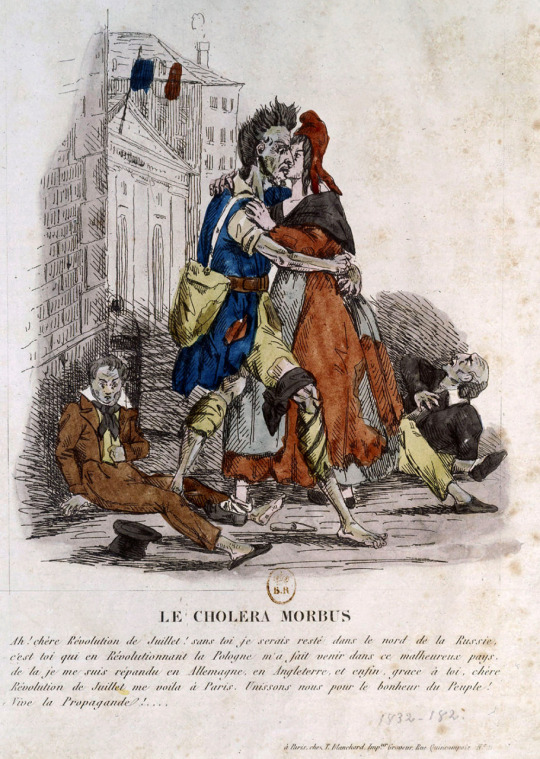
#les mis letters#lm 4.8.2#les miserables#cosette#marius pontmercy#jean valjean#cholera#gorbeau house raid
48 notes
·
View notes
Text


The Malicious Playfulness of the Wind. Volume 4, Book 6, Chapter 1.
Clips from <Il cuore di Cosette>.
#Les miserables#les mis#My Post#Gavroche's Brothers#Gorbeau Raid#The Brick#Il cuore di Cosette#Les Mis Letters
14 notes
·
View notes
Text
After yesterday’s climactic chapter, today’s feels rather dull. And I still feel devastated to give it too much thought. Valjean is finally bringing his money to Paris. Sadly, the underlying message is poignant — he intends to give it away as Cosette's dowry, planning to remove himself from the scene.
I'm fascinated by Hugo's perspective on 'the gloomy parts of this book.' He seems to identify these sections with criminality, Patron-Minette, and the Gorbeau house raid, rather than the deaths of most of his characters. Ah, well…
I recall 'Sieur Boulatruelle' from the Gorbeau hut affair—a drunkard who remained unnamed then. His presence was so absurd that it was hard not to notice him. No surprise that “The authorities had never been able to make out whether he had been there in the quality of a robber or a man who had been robbed.” And this conclusions is really amusing: “his ardor for theft somewhat cooled; but he was addicted nonetheless tenderly to the wine which had recently saved him.” However, I'm not particularly invested in his forest adventures while stalking Valjean.
19 notes
·
View notes
Photo
This is Javert's best and BADASS moment in the Brick!

I love Javert.
#Les miserables#les mis#Javert#Thenardier#Patron-Minette#Gorbeau Raid#Shoot?#It'll missfired!#And other famous lines...#Such as#Would you like MY Hat?#The Brick
297 notes
·
View notes
Text
huge thanks to @persefoneshalott for introducing me to the 1943 Mexican Les Mis movie
It takes an unusual approach, starting with Cosette leaving the convent with Valjean, and them setting up their life together. It actually spends time on this! and their Cosette and Valjean are a super cute family; Valjean delights in giving her presents and being her guide in the world, and she’s so happy to be having adventures with her dad, and there’s a fantastic bit where Valjean shares a Secret Dream with her: that he’s always wanted to buy an old book and read in the garden, and aaaaah it’s so perfect for him and so sweet?? It really makes you feel for them as a family
also Cosette’s clothes are like. Shockingly good for a movie in 1943 about 183X?
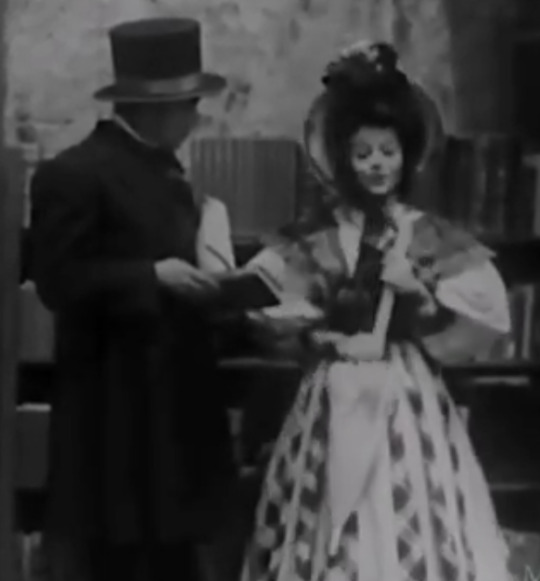
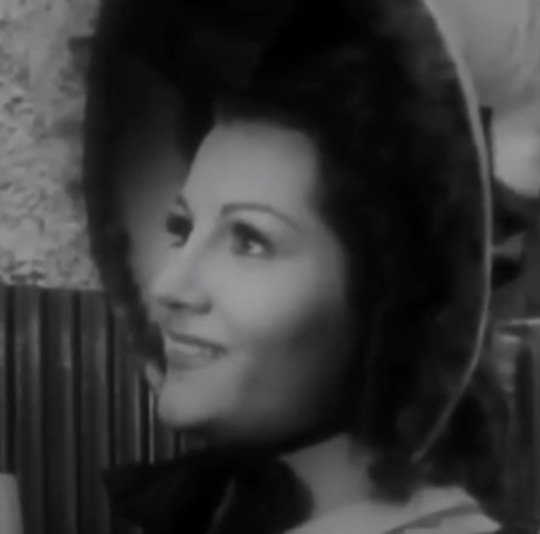

I mean it’s not about to challenge Gentleman Jack for accuracy or anything but this is pretty good! She’s got bonnets and pelerines! And So Much Sleeves!
The guys don’t fare badly either! Marius and Joly are a little too slicked-down maybe (Marius is in the hat, here):

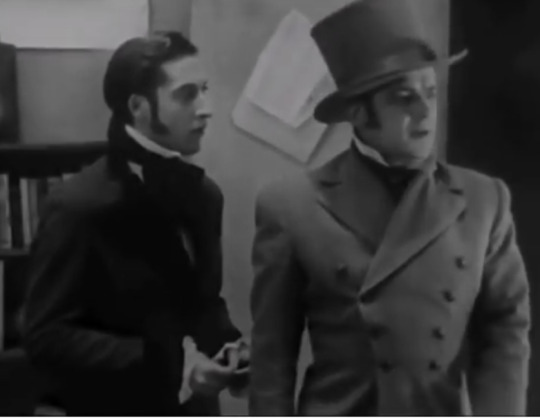
but look at those high collars! Joly’s sideburns! the very stylish over-long sleeve cuffs peeking out from under Joly’s coat sleeves! Even Marius being in a kinda unhip coat works for him.
(Also Joly owns a revolutionary bookstore in this one?? amazing choice)
And look how they use Fashion as social signifier in this scene with Javert, of all people!

That’s Javert; his superior’s valet; and his superior, who is in the process of being dressed in front of him. It establishes Javert’s status so well- you don’t get dressed in front of a social equal, there’s all kinds of rules about what a Respectable Society Man can wear in Real Company , but in front of the servants, well...
(this movie does a great job overall of establishing that Javert is not only not highly ranked, he’s Barely Tolerated and has about the social clout of a guard dog, it’s incredible for that)
ALSO this movie does something I’ve wanted to see an adaptation do for ages, and uses its post-convent starting point to really build up mystery around Valjean! the Mother Superior of the convent notes that he has more money than he should, and also doesn’t remember exactly when he reached the convent. Javert is sure he’s a hardened criminal. The Thenardiers consider him a kidnapper and think he used a position as a city official to steal a fortune. We get the whole Gorbeau raid, with suppositions and theories about him flying thick and fast, and Valjean answers none of it, and the narrative answers none of it, and Valjean gets to be presented as being Mysterious and Shady as hell, and it’s just fantastic?? I love this, let Valjean be a man of Ominous Gothic Mystery!
Also the revolution plot is introduced in the first 15 minutes? Via Marius and Joly of all people? love that for them
anyway I’m only about halfway through but so far this is unironically becoming one of my favorite versions??
95 notes
·
View notes
Text
an especially relatable aspect of jvj's character is the way he turns into a mute video game protagonist whenever he finds himself in a situation he doesn't want to be in. he barely talks through the entire gorbeau raid because he's too busy pressing x to skip thénardier’s dialogue and building up the speed to clip through the window before the unskippable javert arrest cutscene starts
#I wrote this at 5am absolutely loopy with pain and it shows#les mis#les miserables#jean valjean#javert#thenardier#e.txt
1K notes
·
View notes
Text






M. Leblanc's Escape through the Window. Volume 3, Book 8, Chapter 21.
Clips from <Il cuore di Cosette>.
#Les miserables#les mis#My Post#Javert#Patron-Minette#Thenardier#Mme. Thenardier#Eponine#Azelma#Thenardier Sisters#Gorbeau Raid#Jean Valjean#M. Leblanc#The Wolf and the Convict#Sorry Javert but Valjean got the 100% of successfulness of escape after the Orion!#The Brick#Il cuore di Cosette#Les Mis Letters
19 notes
·
View notes
Note
I think... I saw similar one before... as a children's cartoon show.
I... I'd really love the au "YOU are the one who didn't return my guns!" and "Yo- you are supposed to be /dead/?!" meeting between Marius and Javert, if possible :'))


family reunion
#Les miserables#les mis#Javert#Marius#Cosette#Lark and Booby#Saved by adaption#Gorbeau Raid#In that one he finally put Thenardier into the jail!#But this one's also funny too!#Fanfiction#art
127 notes
·
View notes
Text
Brickclub 4.6.1 ‘A Malevolent Trick of the Wind’
Everything is connected, and in the world that exists just underground from respectable society, it’s even more so.
The Gorbeau raid might be the closest thing we get in this book to the police acting “justly.” The crime was real and serious, the perpetrators had committed many such crimes before, and the “correct” people were put in jail.
And even then, no good came of it. Men who were experienced criminals continued on as they were, while women and children suffered. Madame Thenardier will die, Eponine looks newly ghastly and haunted, who knows how Azelma is doing but I’m going to guess “not well”, and Mamzelle Miss and Magnon, who weren’t even there, are in jail and their young children are lost on the streets.
No matter what kind of harm is done, this book says, the people who are made to suffer most from it will be the people who always suffer most.
I don’t know what to do with this thought, but Hugo keeps repeatedly connecting Thenardier to the buying and selling of children. Thenardier is renting a child in the first half of this book, he’s renting out children now--Hugo is leaving a particular kind of evil at his door specifically. And also, Hugo is pulling his punches with what that entails--whatever small children might have been bought and sold for in 1820s Paris, a victimless grift where they’re treated well and (if all had gone well) receive an education in the bargain is a spectacularly least-worst option.
Of course, the novel ends with Thenardier massively upgrading the scope of who he gets to buy and sell.
As many others have pointed out, Magnon is another Theodule, mysteriously hated by the narrator who doesn’t really give us much reason to agree. Maybe she’s not a selfless altruist, but she treated the kids well, and she cared enough to use the time when she was being arrested to make sure they got somewhere safe. That’s a big deal in this book!
I’m also fascinated by the ten pounds a month she payed Thenardier for the privilege of keeping them. Thenardier was at one time receiving money for holding onto a child, and now he’s receiving money for giving children up. He’s very good at finding ways to twist petty profits out of things--and, as we get further confirmation of this chapter, he’s very bad at actually turning any kind of profit overall.
But I’m also interested in the fact that this went on for years and the sum stayed ten pounds, when with Fantine he raised it as often as he could. But Magnon is well-connected within criminal Paris (and also to at least some extent within respectable Paris), and she’s savvy, and she must have the wherewithal not to let him get away with upping the price.
Poor Fantine. Poor mômes.
Poor Magnon, too--however indifferent the narrator thinks her, she lost four children this chapter.
15 notes
·
View notes